South Africa
Mazista: no water, no electricity, scant hope
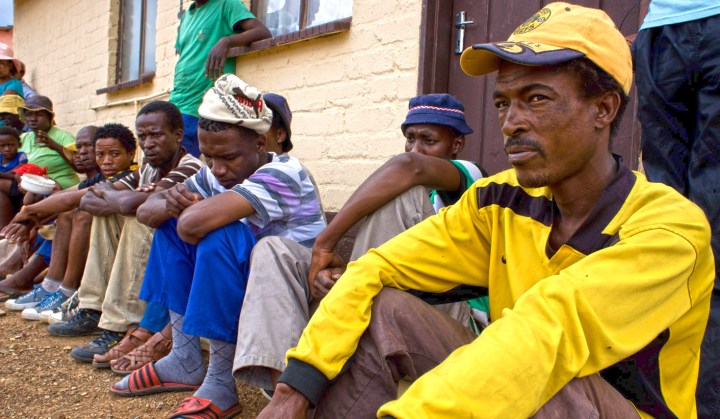
After almost 100 years of existence and 18 years into democracy, the North West town of Mazista still lacks the essential services of water and electricity. It’s blighted by local corruption and an exploitative economy. GREG NICOLSON hitched a ride to see one of the most troubled towns in the country, one with a unique history but whose challenges can be understood across South Africa.
Flora Nyarenda danced on the road as the clouds gathered overhead. In between the rows of peach, blue, yellow and orange RDP houses in Mazista, North West, she sung alone on the slate-scattered path as the rain threatened to unleash. The 85-year-old recently received her house as part of a government housing initiative. “She’s had a drink,” said her 72-year-old friend who had just returned from the soup kitchen.
Nyarenda does not live in her house. It has no water, no electricity and no furniture. She’s unable to take a wheelbarrow to the closest working tap so she stays in her daughter’s house. Her RDP is hollow. Two dead frogs are sprawled in the dust of her bathtub. Maggots writhe in the black shallows of the toilet bowl.
After passing Koster on the R509, the road to Mazista is cratered in potholes. Nonhlanhla Kambule-Makgati and her husband Charles Makgati know each erosion, but I hit the brakes too late each time we hit a war-torn patch of potholes. Nonhlanhla and Charles have spent the last eight years reporting issues in the community and collating a book, Transformation Through the Eye of the Camera: Shierlik & Mazista 2004–2011. They directed me left and we turned into one of South Africa’s worst settlements.
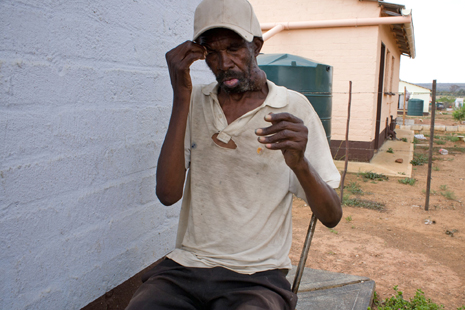
Photo: This Mazista resident says he was beaten by council officials and has since been disabled. He was forced to withdraw the charges of assault due to intimidation.
The married couple are the vanguards of the community. Residents were able to move from the derelict mining hostels to houses after the government built over 500 RDPs as a result of the pressure they applied. But drained by the challenges of publishing a book, our visit was their first time in the community in months. The locals were eager to share their problems when we entered; Mazista is a community stuck between the vulgarities of white rule and an aloof elected government. The problems are endless.
“Why the fuck is this place here anyway?” I asked myself as we entered. The new houses and demarcated roads were a refreshing change from the city townships, but it’s not a place to settle. The wind blows across the open plane, thrashing the sun-beaten red earth. It’s a R12 taxi ride to the nearest grocery store to buy paraffin for cooking. Collecting wood for a fire from the surrounding farms is cause for arrest and a prison sentence.
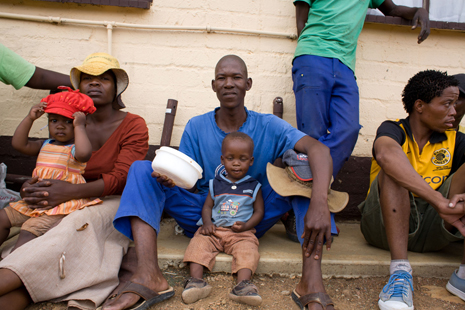
Photo: Mazista residents gathered as our small group of journalists entered the town. The grievances were many and legitimate.
I understand once we go almost a kilometer past Mazista. The Country Slate quarry lies past the electric fence erected to enclose the town. Since the 1920s residents have served as a labour pool for the slate mine, with women, men and teenagers walking each day past the Jacaranda trees that blend into the purple-grey mine dump. Before they received RDPs their conditions were just as bad (Kambule-Makgati, a former photojournalist at The Star, has won multiple awards for her images of the settlement). But little has changed.
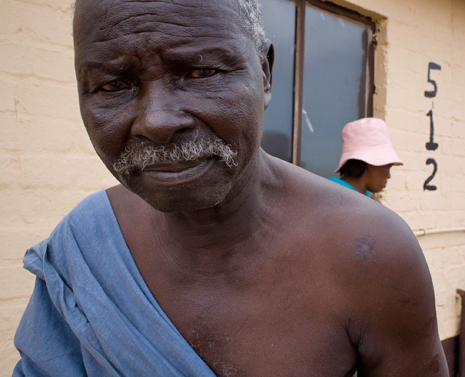
Photo: Alex Ndlovu, 79, shows his scar from the bullet the day Johan Nell shot dead four people in the area in a racist attack.
The area is famous for the racially-motivated shootings of 2008, when teenager Johan Nell shot dead four people and injured others. Sitting on a stack of slate outside the soup kitchen, where locals, many who have HIV/Aids, receive stew and pap, 79-year-old Alex Ndlovu shows the scars on his left shoulder from the shooting.
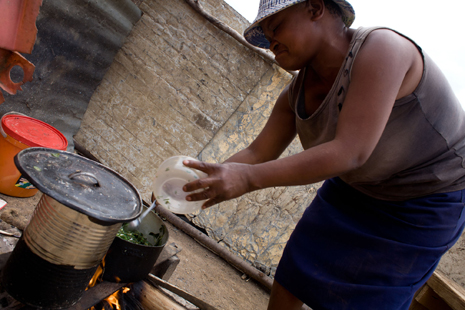
Photo: Linah Matsane, 42, cooks spinach outside over a fire. She can’t cook when it rains, she says, and the children must go hungry. Residents complain that collecting firewood is a problem as they’re arrested if they enter the neighboring farms.
A line of young men sits on the concrete next to him. They have recently been fired from a local brick making company, Kim Bricks, which, despite being set up as a cooperative, is reportedly part-owned by the Audi Q7-driving mayor who is said to be in the pocket of the local farmers. The men, who earned R70 a day, were fired when one of them asked for his end-of-month pay. They had not been paid for two months, but the manager physically attacked the employee when he asked. He then fired workers from Mazista and hired alternatives from another community. It’s just that day’s story in a litany of examples of abuse and exploitation by local businesses. Many of the residents have never lived outside the community and appear cowed by a baas culture.

Photo: Florence Nyarenda, 85, has never moved into her RDP house in Mazista because it lacks electricity and water. Instead, she lives with her daughter who is able to fetch water for the home.
“What’s the manager’s phone number?” Charles Makgati asked the men. Checking his cell phone, one of them said electricity was such a problem that he had not been able to charge his phone. The last time it was charged he had to go to town to ask a white lady on the street if she could do it for him. At home, no electricity means cooking is usually done outside over a fire. When it rains, many of the children go hungry.
Like their parents and some of their grandparents, those children are likely to work in the slate quarry. Students wanting to study matric have to travel tens of kilometers, say Charles and Nonhlanhla, and despite a total population of around 3,000, no youth in the area have finished secondary school, they tell me.
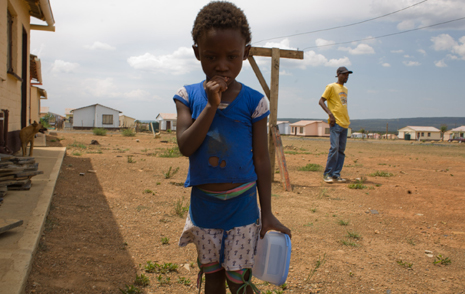
Photo: A soup kitchen run by locals has been set up in Mazista to provide for those in need. Normally, this is the elderly and sick, said an organiser, but with local retrenchments the needy are becoming more and more.
As we leave Mazista, the children start arriving home from school. The post-Apartheid government eventually built them new homes to return to, but with no running water or electricity, they’re not much better than those who lived in the area last century and were reportedly taken care of by mine management before it changed hands. Now, the only water they receive is from the occasional truck that comes through to fill up the water tanks stationed outside each house or what they can get from the neighbouring property.
Mayor Kim Medupe wasn’t available to comment on why the housing was built without essential services or what portion of her budget was allocated to develop the area. But a visit to Mazista leaves no doubt that the community has been forgotten and neglected while forces aim to stifle and control its growth and sustainability.

Photo: Florence Nyarenda, 85, dances in the Mazista streets. They are littered with the fragments of the same slate the town was initially established to mine.
The clouds open up as we left Mazista, as if responding to the call of Flora Nyarenda’s dance. With it comes water for drinking and washing, but it also means the women who were cooking outside have to retreat until the sky clears. The rain fills the potholes on the road out, drenching the red earth. When it ends, the residents of Mazista would know they have water, at least temporarily. But after the downpour they are still left fighting poverty in an untransformed town with a dysfunctional local government. They’ve seen changes, but poor education, lack of services, HIV/Aids, and abuse from employers still prevails. DM
Main photo: A worker from a local brick factory tells how he was assaulted when he asked for his pay after receiving nothing for two months. He and his coworkers were subsequently fired without pay. (All photos by Greg Nicolson)


















 Become an Insider
Become an Insider